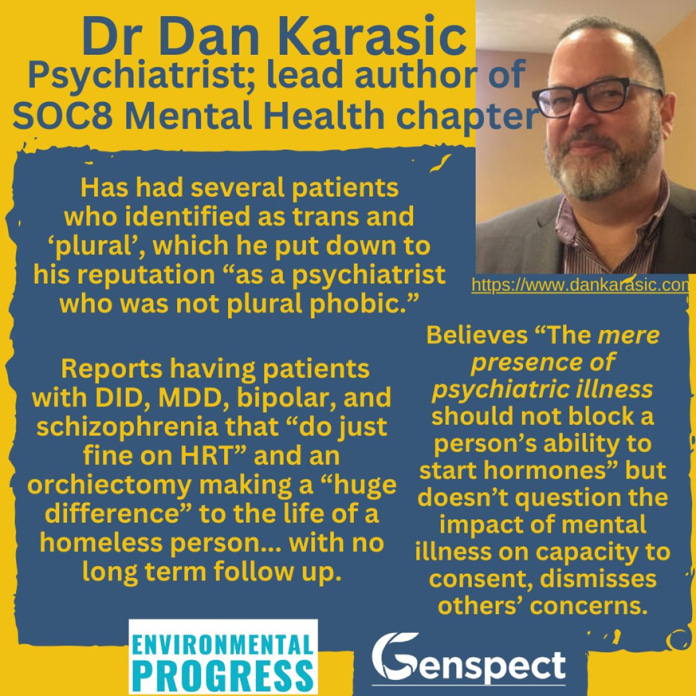In a fascinating interview, Sascha Bailey, son of iconic photographer David Bailey, names social incentives as especially motivating for men seeking sex trait modification, for which medicalization may seem to “fix everything.”
Having pursued gender medicine himself, Sascha suggests functional problem-solving may be a more powerful motivation than is usually assumed. According to Bailey, the impulse is similar to that of “trans maxers,” who adopt a female identity primarily for pragmatic reasons, such as to gain access to female-only entitlements. Himself a “computer nerd,” Bailey met tech types willing to pursue medicalization for such reasons as accessing a female-only STEM initiative.
Bailey calls this “gaming social incentives.” Similarly, homeless men regard food and “gender-affirming housing” as highly desirable. Survival incentives are not a trivial matter for the destitute, so it is interesting to note the reference to homelessness by gender clinicians.
Once referenced as “best practice,” the World Professional Association of Transgender Health, WPATH, is now exposed for promoting gender medicine, basically, to all comers. Ever since Michael Shellenberger’s release of their internal communications from whistleblower(s), known as the WPATH files, the public has been registering the urethral and sexual dysfunction WPATH’s affirm-only model can cause. And while many question how this targets kids, the WPATH “standards” also provide cover for brutal genital surgeries on defenseless adults.
A case discussed in the WPATH files is the adult exhibiting dissociation (as multiple or split personality) revealing that WPATH speed dials hormones and radical surgeries even for unstable adults. WPATH psychiatrist Dan Karasic, prominent in the files, addressed US members in 2017, detailing what he considered a successful case of a “genderqueer” bipolar male who underwent nullification, a surgery eviscerating genitalia to produce a “flat front.”
Karasic comments, “Psychiatric illness should not block a person’s ability to start hormones if they have persistent gender dysphoria, capacity to consent, and the benefits... outweigh the risks.’ Removing therapy as an option, consent is misconstrued as suicide or medicalization.
The incapacity to consent doesn’t deter medicalization for the giant of gender Karasic. However, consent is at issue in a legal case involving Layton (Hannah) Ulery, who experienced gender confusion amid a period of memory loss when switching between multiple personalities. In summarizing the case, Eliza Mondegreen calls out Jason Rafferty, author of America’s Academy of Pediatrics’ WPATH-based endorsement of “gender-affirming” medicine, who was one of Ulery’s doctors.
Rafferty noted Ulery’s conflicted alters (or personalities), yet approved medicalization anyway. In relating the story, Mondegreen describes a session at the 2022 Montreal WPATH conference, in which clinicians were instructed to overcome the inability to consent by convening a council so the alters could individually agree. A council?
In the WPATH files, the problem is not resolving mental health issues but how to avoid liability. Not just dissociation but homelessness is emphasized by WPATH practitioner Karasic, who lists it among comorbidities: “major depressive [disorder], cPTSD, and homelessness.” Certainly, homelessness typically coincides with mental disabilities and addictions, but this placement interestingly lumps the homeless with other vulnerable individuals.

Under its housing regulations, the government offers “gender-affirming housing” which involves "utilization of a gender affirmation framework in providing care, treatment, and support services,” teaching emergency shelters to offer “processes whereby a person receives social recognition, value, and support for their gender identity and expression.”
This naturally raises questions about how such a program might be viewed by fragile adults, many of whom have mental health issues and confusion. Featured on a YouTube channel taking its name from a Winston Churchill quote referencing wartime vulnerability is a man named Egggod. An emotionally naive trans-identifying man who lives in shelters on Skid Row and utilizes SSI Supplemental Secure Income, Egggod plans to make a career in modeling despite numerous tattoos. Significantly, he accesses hormone shots with food.
In at least one WPATH member’s surgical practice, homeless adults are well represented. Working at a gender clinic in Portland, Oregon boasting the "highest volume" of genital surgeries on the West Coast, “non-binary” Dr. Blair Peters presents vulvaplasty (vaginoplasty without a canal) as tailor-made for the low-support homeless adult he frequently sees, who won’t have the privacy to dilate a vagina on a daily basis.
Peters (21 min. in) explains a good portion of his patients are homeless adults with varying degrees of social support “who just want to be able to change in public restrooms or locker rooms and thus feel safer if they don’t have male genitalia.” Wait, what? Homeless adults naturally want to protect against rape, part of life on the streets, but surgically eliminating genitalia on that basis is F’d up.
Often addicted and disoriented from mental health issues, homeless adult men cannot consent, having no real idea of the trauma of genital surgeries that leave patients with on average three severe complications even when the procedure is considered successful. Peters acknowledges the surgeries result in “big injuries” but goes on to note the demand in Portland is for more queer “non-binary” surgeries, in itself an oddity raising questions about supposedly “medically necessary” surgery taking unique shapes or attracting primarily vulnerable populations.
The WPATH files expose the kind of injuries entailed as well as the unethical suicide or sex-trait modification paradigm on which the standards are based. For destitute adults desperately seeking food and shelter, it may not be stigma but social incentives that influence behavior. It is at least possible that for many at-risk adults, repeated inquiries about gender as part of housing placement inextricably associate claiming an identity with desirable social rewards.
How often indigence follows medicalization is unclear, but it is commonplace to assume extreme want results from social stigma and ostracism. What if there’s something more going on? Perhaps it is no accident that Karasic lumped homelessness in with his listing of psychological issues and made it clear such conditions are not enough to deter medical treatments. Peters similarly singles out the homeless, exceptional in regards to his surgical approach rather than as a red flag similar to the marked prevalence of patients with dissociation.
The WPATH files show some gender clinicians, under the guise of harm reduction, regard medicalization as a kind of universal antidote not just for mental disorders such as dissociation but for dire circumstances facing the homeless, and that usually means adult men.
Wrong Speak is a free-expression platform that allows varying viewpoints. All views expressed in this article are the author's own.





It is clear to me that this is a huge motivator for vulnerable kids in care. There are lots of additional services - and a ton of additional "love" -- available to kids who identify as trans or nonbinary. These are kids who are where they are precisely because they are poor and haven't gotten enough steady reliable love during their lives.
Advocates insist homeless kids and kids in care are disproportionately gender non-conforming because of their families rejecting them. I think the agencies where they work are begging for a public inquiry.
Great article. I’d heard one Sasha Bailey interview and read the WPATH files but hadn’t considered how meaningfully they dovetail. I also wonder in all seriousness how prevalent severe mental illness is among treatment professionals?